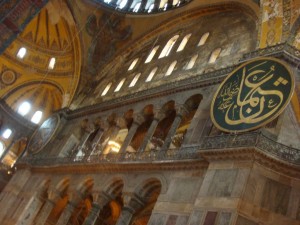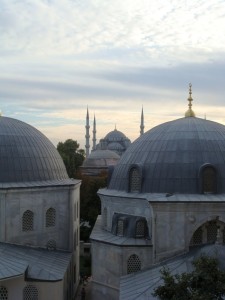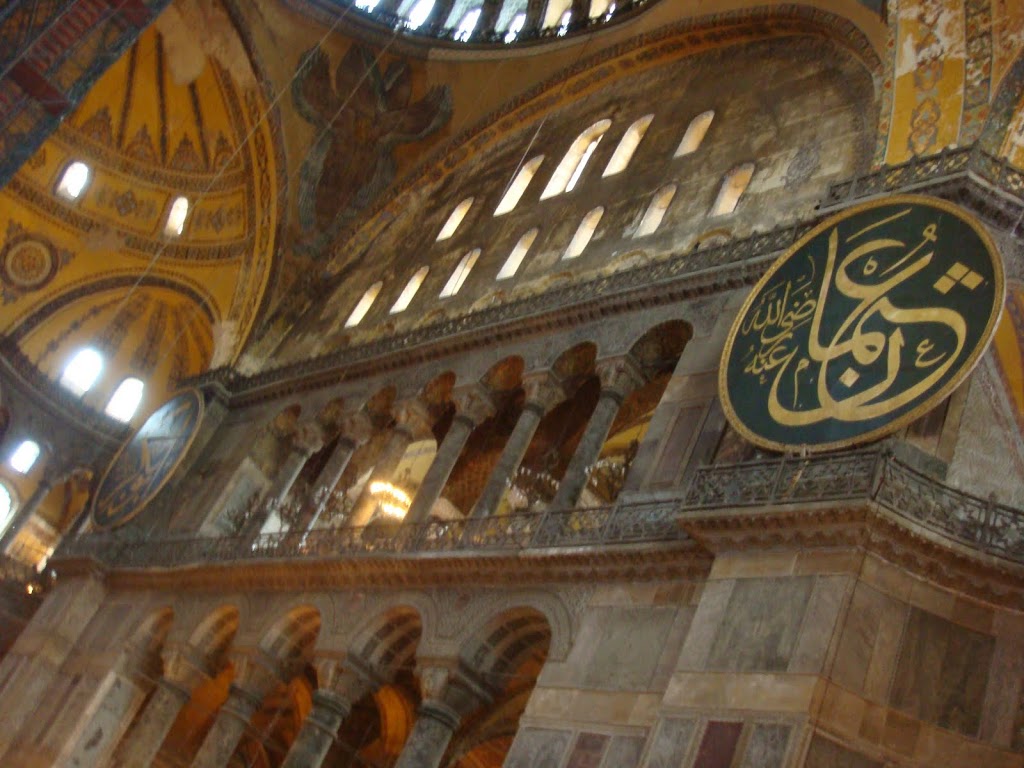
(originally published in the Greenwich Citizen)
I first noticed him when he crossed the threshold into Hagia Sofia the wrong way. In Buddhist temples, you always enter with your right foot first and leave with your left foot. Since living in China, I’ve picked up the habit of watching how I enter religious spaces. He stepped in with his left foot first. I followed with my right.
Istanbul’s Hagia Sofia isn’t much of a religious space any more. The building has gone the way of the nation that surrounds it: an important seat of early Christianity, it converted to Islam and then a secular institution. The Cathedral turned Mosque turned Museum was one of the things that drew me to Istanbul, but I’d put off visiting once I arrived because I was suffering from the Lonely Traveler’s Blues. Three hundred and sixty days a year I am happy to explore all the world has to offer. The other five, I wonder why on earth I have left family and friends in all the places I’ve lived, and hate the idea of surrounding myself with strangers in a foreign city.
It usually passes in a day, sometimes less, but my first few days in Istanbul proved especially trying. It was my own fault, completely. I’d come to the city without a Plan, armed with only a few distant contacts and ghostly potential job leads, and about a hundred different impulses but no specific reason why I had decided to stop in this city, of all places.
It had taken a massive effort of will to get myself to Hagia Sofia, especially when I found out the entry price was 20 lira, or $13, which was my daily budget. It was this strange man stepping over the threshold the wrong way that drew me in as much as anything else.
We followed tandem paths around the building, looking at the same mosaics in different order. I took pictures across the sanctuary while he took pictures of the dome. He wandered over to a window and nudged it open. I had to stand on a ledge to see out. In between the ancient buttressing, you could see the mosque Sultan Ahmet had constructed at the beginning of the 17th century. Some say he built it as a challenge to the old Roman Emperor Justinian’s Hagia Sophia, a very visual demonstration that the Muslim Ottomans could match or outdo their 6th century Christian predecessors. But why, I thought, would he have built a structure that looks so similar? In my eyes, the two buildings look like brother and sister: one dressed in pink, one in blue, but obviously from the same family.
Muslims call Christians and Jews ‘people of the book,’ like themselves. All three faiths believe in one God, arguably the same God. Just as the Christian Bible incorporates the Hebrew Bible as its old testament, the Quran tells the story of Abraham, and Moses, and even Jesus. The view that dominates western media, intentionally or unintentionally – that Christians and Muslims are fundamentally different types of people – makes no sense to me. Over the last two months, every fear I harbored of the rise of militant Islam has been countered by acts of extraordinary generosity and friendship. For every jihadist who is profiled in the news, there must be a million peaceful men, women, and children whose stories never get told. I can’t blame the media, though: they have to write what sells, and what sells is and always seems to have been violence and fear.
I made my visit to Hagia Sofia long before I was qualified to make any sort of judgment on the country or the people around me. On that day, I was still nursing my inexplicable Lonely Traveler’s Blues, though something was pulling me out of it. Certainly most of the credit must go to the Hagia Sophia and Sultanahmet Mosque, two indescribable monuments to human achievement which cannot fail to inspire. But part of it, too, was my silent museum partner.
We ended up talking, finally, by one of the toppled columns that litter the garden around Hagia Sophia like fallen leaves. I asked if he was Italian. I’d based my guess on the fact that he was wearing the kind of pointed boots I have only ever seen on gay men and Italians. No, he said, he was German, here studying Turkish, and what was I doing in Istanbul?
I don’t remember which of my stable of answers I gave him – interest in the Islamic world/medieval history/contemporary EU politics, desire to travel, lower cost of living, love of kebabs – but it was enough to start a conversation that continued for the next four hours. We visited the blue mosque and strolled through the garden outside the Sultans’ old harem. As the sun set, we stopped for tea at a cafe looking over the Bosphorus, the bustling strait of water which divides Istanbul’s European half from its Asian.
We parted ways soon after that, each pleading dinner commitments, though I know I at least could have easily missed the dinner I had planned. It was better, I thought, to leave things as they were. We’d had a lucky meeting of minds in the heart of old Istanbul, but we had separate lives to return to in the world outside. He was heading back to Germany in five days, I was hoping to find a job that would support me in Istanbul until I went home for Thanksgiving. At the last minute, he gave me his email address, but when I waved goodbye from the bus I was pretty sure it was the last time I would ever see him.
As my bus trundled up the European side of the Bosphorus, I looked at Istanbul with new eyes. Pale mosques, lit by spotlights, glowed yellow, and their reflections danced in the water. There had been nothing particularly remarkable about our meeting, but it revived whatever had been laying dormant since my arrival in Istanbul, and I was finally ready for the city.
Istanbul had apparently decided she was ready for me as well. I found an internship with CNN’s correspondent in Istanbul the next day and moved into a fantastic apartment in the center of the city a week later. My neighbors offered to show me around, had me over for dinner, and one, a Greek, invited me to his niece’s Christening.
And so the traveler part of me has gone with the lonely blues, at least for now. A new friend of mine recently asked how long I’ll be living here. I think I surprised myself as much as her when I said I wasn’t sure I’d ever leave. I will live other places, I’m sure, and might never call Istanbul home. I’m not even positive I’ll be returning after Thanksgiving. But I will always pass through here, and always be looking forward to my next stay. This is not a place that can be visited once.
Share this: